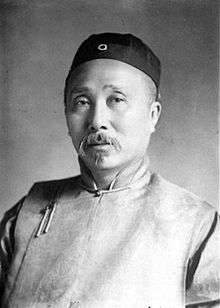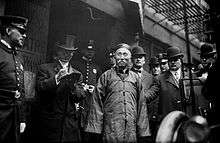Wu Tingfang
| Ng Choy (Wu Tingfang) | |
|---|---|
 | |
| Chinese Unofficial Member of the Legislative Council of Hong Kong | |
|
In office 1880–1882 | |
| Appointed by | Sir John Pope Hennessy |
| Succeeded by | Wong Shing |
| Premier of State Council of the Republic of China | |
|
In office May 23, 1917 | |
| President |
Li Yuanhong Feng Guozhang |
| Preceded by | Duan Qirui |
| Succeeded by | Li Jingxi |
| Personal details | |
| Born |
30 July 1842 Malacca, Straits Settlements |
| Died |
23 June 1922 (aged 79) Canton, Kwangtung, Republic of China |
| Political party |
Republican Party Progressive Party |
| Children | Wu Chaoshu |
| Alma mater |
St. Paul's College University College London Lincoln's Inn |
| Profession |
Lawyer Diplomat Calligraphist |
| Wu Tingfang | |||||||||||||||
| Chinese | 伍廷芳 | ||||||||||||||
|---|---|---|---|---|---|---|---|---|---|---|---|---|---|---|---|
| |||||||||||||||
| Ng Choy | |||||||||||||||
| Chinese | 伍才 | ||||||||||||||
| |||||||||||||||
Wu Tingfang (Chinese: 伍廷芳, also known as Ng Choy (Chinese: 伍才; pinyin: Wǔ Cái); 30 July 1842 – 23 June 1922) was a Chinese diplomat and politician who served as Minister of Foreign Affairs and briefly as Acting Premier during the early years of the Republic of China.
Career in Hong Kong

Wu was born in the Straits Settlement, now modern day Malacca in 1842 and was sent to China in 1846 to be schooled.[1] He studied at the Anglican St. Paul's College, in Hong Kong where he learned to read and write in English. After serving as an interpreter in the Magistrate's Court from 1861 to 1874,[2] marrying Ho Miu-ling (sister of Sir Kai Ho) in 1864.
He studied Law in the United Kingdom at University College London and was called to the bar at Lincoln's Inn (1876). Wu became the first ethnic Chinese barrister in history. After being called to the bar in England, he returned to Hong Kong in 1877 to practise law. He was admitted as a barrister in Hong Kong in a ceremony before Chief Justice John Smale welcomed him to the bar and said:
"In England every office becomes open to talent without favour of affection. A distinguished American statesman has become, and now is an ornament of the English bar, and all the Bar will gladly hail the time when a Chinaman shall distinguish himself as much as the eminent counsel to whom I refer. I have seen stranger things happen."[3]
Later, Wu became the first ethnic Chinese Unofficial member of the Legislative Council of Hong Kong (appointed 1880).[4]
Service under the Qing Dynasty

He served under the Qing Dynasty as Minister to the United States, Spain, and Peru from 1896 to 1902 and from 1907 to 1909. In this role he lectured widely about Chinese culture and history, in part working to counter discrimination against Chinese emigrants by increasing foreign appreciation of their background. [5] To further this end, he published America, through the spectacles of an Oriental diplomat in English in 1914[6] (published by Stokes).[7]
Wu is mentioned several times in the diaries of Sir Ernest Satow who was British Envoy in China, 1900-06. For example, on 21 November 1903: "Wu Tingfang came in the afternoon, and stopped talking for an hour and a half about his commercial code and connected subjects. His idea is to draft also a new criminal code, and put both into force at the outset in the open ports." [8]
Service post Xinhai Revolution
He supported the Xinhai Revolution and negotiated on the revolutionaries' behalf in Shanghai. He served briefly in early 1912 as Minister of Justice for the Nanjing Provisional Government, where he argued strongly for an independent judiciary, based on his experience studying law and travelling overseas.[9] After this brief posting, Wu became Minister of Foreign Affairs for the ROC. He served briefly in 1917 as Acting Premier of the Republic of China.
He joined Sun Yat-sen's Constitutional Protection Movement and became a member of its governing committee. He advised Sun against becoming the "extraordinary president" but stuck with Sun after the election. He then served as Sun's foreign minister and as acting president when Sun was absent. He died shortly after Chen Jiongming rebelled against Sun.
References
Notes
- ↑ http://www.thechinastory.org/ritp/wu-ting-fang-伍廷芳/
- ↑ . Chinese Unofficial Members of the Legislative and Executive Councils in Hong Kong up to 1941, T C Cheng
- ↑ Re Ng Choy, [1842-1910] HKC 109
- ↑ "Hong Kong Yearbook 2004".
- ↑ Wong, K. Scott. (1995) Chinatown: conflicting images, contested terrain. MELUS 20(1):3-15.
- ↑ Wu Tingfang, America, through the spectacles of an Oriental diplomat Stokes (1914); Bastian Books (2008) ISBN 0-554-32616-7.
- ↑ "People who write". The Independent. Jul 6, 1914. Retrieved August 1, 2012.
- ↑ Ian Ruxton, ed. The Diaries of Sir Ernest Satow, British Envoy in Peking (1900-06), Lulu Press Inc., April 2006 ISBN 978-1-4116-8804-9 (Volume One, 1900-03, p. 389)
- ↑ Xu Xiaoqun. (1997) The fate of judicial independence in Republican China, 1912-37. The China Quarterly 149:1-28.
Further reading
- Pomerantz-Zhang, Linda. (1992) Wu Tingfang (1842-1922): reform and modernization in modern Chinese history. ISBN 962-209-287-X.
External links
| Wikimedia Commons has media related to Wu Tingfang. |
- Works by Wu Tingfang at Project Gutenberg
- Works by or about Wu Tingfang at Internet Archive
- America, through the spectacles of an Oriental diplomat, by Wu Tingfang at Project Gutenberg
| Legislative Council of Hong Kong | ||
|---|---|---|
| Preceded by Hugh Bold Gibb |
Unofficial Member 1880–1882 |
Succeeded by Frederick Stewart as unofficial |
| New office | Senior Chinese Unofficial Member 1880–1882 |
Vacant Title next held by Wong Shing |
| Political offices | ||
| Preceded by Duan Qirui |
Premier of the Republic of China 23–25 May 1917 |
Succeeded by Li Jingxi |